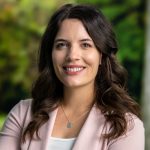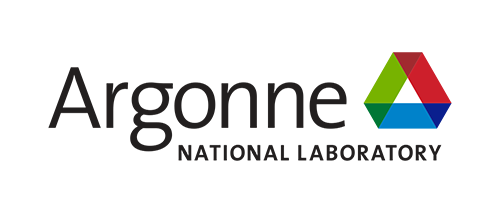March 2023 Edition

Lindsay Buettner, University Student Program Lead, STPO
Buettner sees holistic approach to avoid imposter syndrome and achieve a STEM career
Lindsay Buettner, a university student program lead in the Science and Technology Partnerships’ Educational Programs, believes in taking a holistic approach to guide students in STEM careers and to avoid imposter syndrome, because that helped her professionally as well.
The holistic approach started when Buettner was younger, a time when she debated with herself on whether she was qualified for a professional opportunity.
“I had a million ‘what if ’ questions that were discouraging me from applying,” she said.” Then a personal mentor simply asked me, ‘What do you have to lose? Even filling out the application is valuable experience.’ If he only knew that I have kept that with me for probably hundreds of dilemmas, small and big, for years now. What do I have to lose in trying something new, putting myself out of my comfort zone, asking a question, advocating for myself? Nothing. Even if it doesn’t turn out the way I hoped, I approach each process as a learning experience.”
Buettner uses that same advice when working extensively with students to combat imposter syndrome. She manages undergraduate and graduate students engaging with U.S. Department of Energy’s Argonne National Laboratory. This includes recruitment, skill bootcamps, internships and other student appointments. She facilitates the connection between students and researchers (also called mentors), and supports those pairs before, during, and after their research engagement with Argonne. That support is holistic, with academic, career, and social/emotional programming to help students overcome imposter syndrome, bolster their STEM identity, and connect them to their next step. She also focuses on increased equity and access across opportunities for students in groups that have traditionally been underrepresented in STEM.
“I have the privilege of looking into the future, and it is bright,” Buettner said. “The students my team gets to support and work with daily are the future thinkers, innovators, and change agents for STEM. They will work on technologies and methods that don’t even exist yet. Their enthusiasm and ability to see limitless potential is inspiring.”
Buettner earned a master’s degree in school counseling from Lewis University and a bachelor’s degree in psychology from Loyola University Chicago. She lives in Woodridge with her 9-month-old son, Theo, and husband, Chris, who has a bachelor’s degree in biology. Chris is a pharmaceutical clinical study manager for Astellas. Besides Chris, Buettner has numerous in-laws and friends in STEM majors and professions.
“It’s the running joke that this counselor is the only one to end up at a national lab,” she said.
After earning her degrees, Buettner spent several years in the post-secondary world helping students explore their professional interests, build transferrable skills and connect them to internship opportunities. She then attended a tour and information session at Argonne to learn more about the career pathways available for her students and she fell under the spell of the laboratory herself. Buettner started working at Argonne in March 2020.
“Argonne is such a unique environment for students to be exposed to the realm of national labs, as well as how their research connects to academia, industry, local communities, and even national/international development,” she said. “I knew I wanted to be a part of opening this door of opportunity to students.”
She firmly believes that each student has a voice, and it is important to use as an intern.
“That voice is shaped by your unique experiences, and it adds value to your personal and professional environments,” Buettner said. “Speak up! Anyone starting out in a field experiences imposter syndrome, afraid of asking what could be deemed as a ‘dumb’ question, doubting their qualifications for that role and wondering if they have what it takes to succeed.”
She believes imposter syndrome is doubly true for women, who are still an underrepresented group in STEM.
“There is this invisible, added pressure when you’re the only woman in the room. ‘Will I sound intelligent? Will my idea be heard? Should I volunteer for this task or does the researcher want someone else to do it?’ Who knows how many experiences we have collectively missed out on as women by giving into those negative thoughts and not using our voice. Advocate for yourself and your ideas.” Buettner said.
Buettner also subscribes to the butterfly effect in life, meaning one small action can have a large impact down the line on yourself, on others, and on complex societal systems.
“That’s not to put pressure on each of your actions to have huge significance, but rather a reminder that all accomplishments start small,” she said. “Think of a female leader in STEM who you admire. Every single one of those women was at one point a student, trying to get to class on time or completing a homework assignment. So have confidence in yourself, be open to opportunities and celebrate your ‘tiny’ wins. You are building your STEM pathway, one brick at a time.”
In addition, Buettner believes in work-life balance as part of building that pathway, especially as a mother of a newborn.
“I had an incredible amount of anxiety before his birth on work-life balance,” she said. “On my professional side, I was concerned that I would be viewed differently at work and would have to put my professional ambitions on hold. Then on my personal side, I worried I would feel guilty leaving him to go to work, and my attention would always be split. By and large, I was able to avoid those concerns and find balance by communicating. Self-advocacy is something I have personally struggled with as a woman, particularly not wanting to seem incapable if I ask for help or seem difficult if I propose an alternative.”
However, once she let go of that negative self-talk, she started a meaningful dialogue with others. Both at work and at home, she had a village that has been accommodating when she clearly communicated her thoughts or needs.
“Particularly at Argonne, I’ve found the environment and people who work here to value their employees as humans,” she said. “Work and life responsibilities will constantly evolve, and I firmly believe everyone involved being on the same page is key to finding balance.”
Success in her role ultimately comes from serving others, such as connecting students to opportunities, support networks, research mentors, and their inner power.
“Motivation for that is both internal as I am fulfilled by supporting others to achieve, and external from the student feedback we receive,” she said. “That email from a former student, years after their internship, updating you on their new job, graduate degree, house they bought, etc. and citing their experience at Argonne as the catalyst is fuel for me. Anyone at the lab who is involved with students, directly or indirectly, has the power to effect change at such a pivotal moment in their personal and professional lives.”


